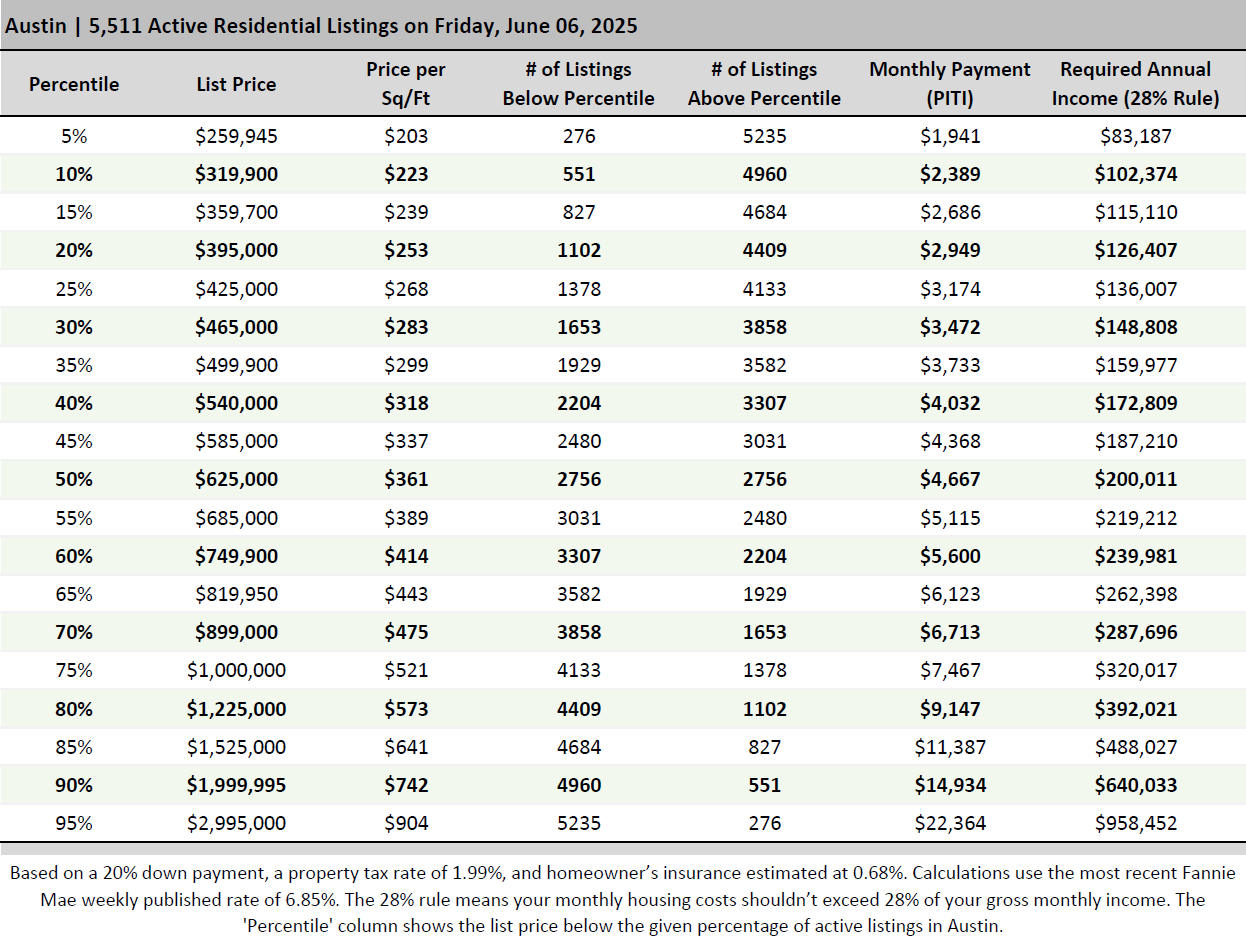What Salary Do You Need to Buy a Home in Austin? (2025 Real Estate Breakdown)
Published | Posted by Dan Price
What Salary Do You Need to Live in Austin?
Living in Austin, Texas has become a dream for many, but turning that dream into reality now requires a careful look at housing costs and income requirements. As of June 2025, the housing market in Austin presents a clear picture of affordability challenges driven by rising home prices and mortgage interest rates. Based on current data, a household needs to earn approximately $200,000 annually to afford a median-priced home in Austin. This figure is grounded in the 28% rule, a standard used by mortgage lenders which states that housing expenses should not exceed 28% of gross monthly income.
In today's market, the median list price of a home in Austin is $625,000. Using a 20% down payment, a 6.85% interest rate, property taxes at 1.99%, and homeowner's insurance at 0.68%, the monthly payment (including principal, interest, taxes, and insurance) comes to around $4,667. Under the 28% rule, this payment requires an annual household income of $200,011. This is the baseline income for purchasing a home priced at the 50th percentile.
However, most households in Austin fall short of this benchmark. The median household income in the city is estimated between $87,000 and $95,000, which supports home purchases in the $259,000 to $319,000 range—prices that fall into only the bottom 5% to 10% of active listings. For instance, a home listed at $319,900 requires an income of approximately $102,374, while a $259,945 home requires about $83,187. This means over 85% of homes on the market are out of reach for the average buyer relying on traditional financing.
The affordability gap is further underscored by the price-to-income ratio in Austin. Traditionally, a ratio of 3 to 4 times the median income is considered healthy. Currently, that ratio stands around 7.2 times, indicating that housing prices have significantly outpaced income growth. As a result, many buyers are either priced out of the market or are being forced to make higher down payments, extend their commute to outer suburbs, or opt for smaller homes and townhomes.
Austin currently has over 5,500 active residential listings. Of these, 53% have experienced recent price reductions, suggesting a shift toward a buyer’s market. The activity index sits at 21.8%, and the months of inventory is 6.1—both metrics indicating softer demand and growing supply. Despite these conditions, affordability remains constrained by high interest rates and elevated home values.
Home affordability by percentile offers further insight. To afford a home in the 25th percentile, listed around $425,000, a buyer needs an income of $136,007. At the 35th percentile ($499,900), the required income rises to $159,977. Homes listed in the 75th percentile, around $1,000,000, require an annual income exceeding $320,000. The top 5% of listings, priced near $2.995 million, demand a salary approaching $958,452. With only 15% of listings priced below $400,000, the majority of homes are simply not affordable for most working families in the city.
To adapt, homebuilders have started producing smaller, more affordable units and high-density developments. Meanwhile, buyers are increasingly relying on creative financing solutions, including mortgage buydowns and shared equity programs. Still, these strategies do little to alter the underlying math: buying a home in Austin in 2025 requires a six-figure income for most properties.
For those asking, "What salary do you need to live in Austin?"—the answer is clear. A household needs to earn upwards of $200,000 per year to comfortably afford a median-priced home under conventional lending standards. Those earning under $100,000 will find their options limited to a small fraction of the market, unless they are willing to accept compromises on location, size, or housing type.
As the city continues to grow and evolve, affordability remains one of its most pressing challenges. Understanding the income required to buy a home in Austin is the first step in making informed decisions, whether you’re a first-time buyer, a relocating professional, or an investor looking at long-term trends.
Frequently Asked Questions (FAQ)
1. What is the average salary needed to buy a home in Austin, Texas in 2025?
The average salary needed to buy a median-priced home in Austin in 2025 is approximately $200,000. This figure is based on a $625,000 home price, a 20% down payment, and a mortgage rate of 6.85%, following the 28% rule for housing expenses relative to gross income.
2. Can someone earning $100,000 a year afford a home in Austin?
A $100,000 salary supports monthly housing costs of about $2,333. This budget aligns with homes priced between $319,000 and $350,000. Currently, only 10% to 15% of listings in Austin fall within this range, making it difficult—but not impossible—for someone earning $100,000 to purchase a home, especially if other debts are low or a larger down payment is available.
3. What percent of homes in Austin are affordable for median-income households?
As of mid-2025, only about 10% to 15% of active listings are affordable for median-income households earning $87,000 to $95,000 annually. This reflects a significant affordability gap, with the majority of homes requiring much higher incomes to purchase.
4. How has Austin’s housing affordability changed over the years?
Austin’s price-to-income ratio has increased steadily, now hovering above 7.2x. In previous decades, this ratio was closer to 3 to 4 times income. Rapid home price growth, especially between 2020 and 2022, has outpaced wage gains, reducing affordability even as price growth has slowed more recently.
5. Why are homes so expensive in Austin compared to local incomes?
Several factors contribute to high home prices in Austin: sustained population growth, limited housing supply, investor activity, and increased construction costs. While home values surged during the pandemic-era boom, local incomes have not kept pace, resulting in a growing affordability crisis that now affects most buyers across the city.

Related Articles
Keep reading other bits of knowledge from our team.
Request Info
Have a question about this article or want to learn more?


